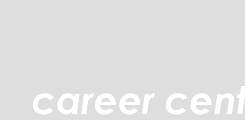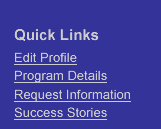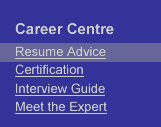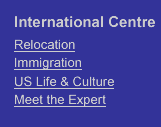



| Summary of skills | ||
Think
of this as the "headline" to the "advertisement"
that will "sell" you to the employer. Select your top
skills, abilities, and strengths, keeping in mind that they must
pertain directly to the job you wish to get in order to be effective.
For instance, you may be the world's best yarn-twister, hands down. You may even be in the Guinness Book of Records for yarn-twisting. But if the job you want involves nursing, yarn twisting won't be much help. Be sure to select only skills, abilities and strengths that are appropriate to your desired position to ensure that you stay targeted and focused. Write
concisely, and write well. If your language skills are a little
weak, invest in some writing aids such as Strunk and White's The
Elements of Style. You can't go wrong with these, as communication
skills are a plus for all employers. |
||
Work history |
||
If
you have a resume that details every job you've held back to the
babysitting you did in high school, it will be a relief to know
you can throw those out, freeing up a great deal of space for important
information. The last 2-8 years are considered the most important
unless you are a Senior Executive and you need to show a more complete
career track. Earlier positions can be included in a block of additional
experience, in which they're condensed (unless you need to show
certain skills that you have not used in the last 10 years but are
needed for your target) so an employer can see, without being burdened
by too much information, how you've grown.
It's important to be concise and pointed. Back up the statements made in the skill summary with information that demonstrates how you used your skills, and show how they benefited your previous employers. Here, too, it's vital to remember your target and choose and arrange information so that it will highlight your abilities and background as they relate to your desired job or field.
|
||
| Education | ||
A
section giving an overview of your education usually comes at the
end, but if it's particularly relevant to your job target, you can
place it early in the resume following the opening skill summary.
Give brief information that includes the level and kinds of degrees you have and the schools from which you earned them. If you have certifications in your chosen field or ones that show you could easily secure any required certifications, list them either before or after the continuing-education portion of this block. The relative importance of the certifications will determine their position; for instance, if you have a Microsoft Certified Systems Engineer certification, this will be more important for a job involving computers than one involving emergency medicine.
|
||
| Finally — a resume that gets noticed | ||
You're
just about done, and you should have a much stronger resume document.
Just a few additional pointers to consider:
* Personal information — age, marital status, health, ethnicity — has resulted in litigation for someone, somewhere, and employers don't want to be burdened with that kind of knowledge. * References aren't included either, largely because they are submitted at a later stage in the process when mutual interest has been established between you and the employer. This is another small space-saving tip that can be a real help, especially if you're on the cusp of a second or third page and don't want to spill over.
* Often, particularly for a job you really want, there's no substitute
for having a resume professionally prepared. Just knowing that specialists
— who keep up with industry and job trends, and innovations
in resume preparation — are preparing a powerful document
for you can be a big boost of confidence, which allows you to wow
interviewers. And you can't put a price on that. |


